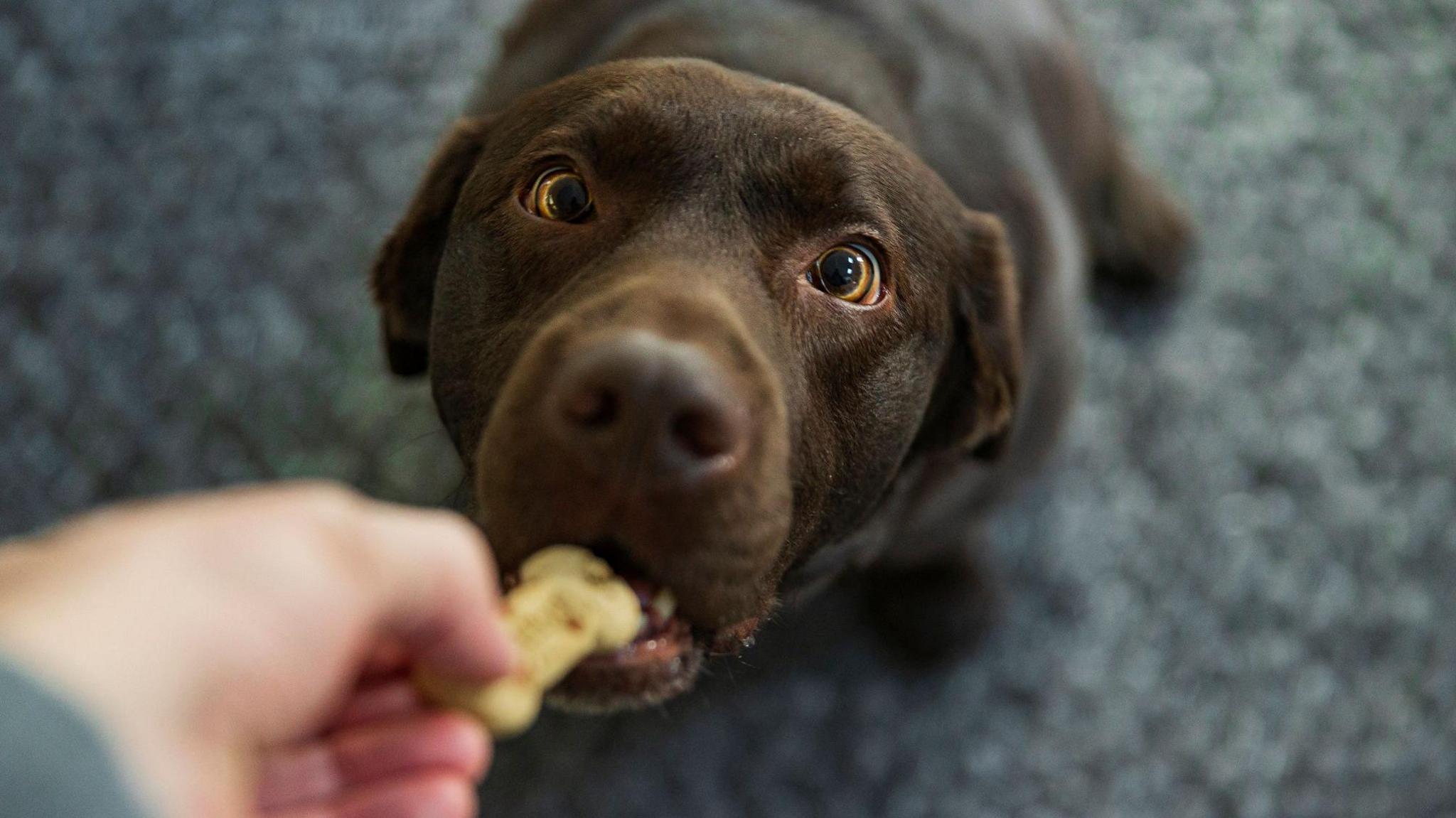Lab-grown meat set to be sold in UK pet food

Cultivated chicken is expected to soon be found in UK pet food (file picture)
- Published
The UK has become the first European country to approve putting lab-grown meat in pet food.
Regulators cleared the use of chicken cultivated from animal cells, which lab meat company Meatly is planning to sell to manufacturers.
The firm says the first samples of its product will go on sale as early as this year, but it would only scale its production to reach industrial volumes in the next three years.
No applications for cell-cultivated products for human consumption have been authorised in Great Britain.
The Food Standards Agency (FSA) welcomed the move and said it closely monitors any new product coming onto the market.
Lab-grown meat has proved a divisive topic in some countries, with advocates pointing to environmental and animal welfare benefits, while critics say it is expensive and could negatively impact farmers.
Question marks remain over the product's long-term future. Global investment in the cultivated meat and seafood sector dropped dramatically in 2023 to less than a third of what it was the year before, a report by the Good Food Institute, external found.
It is unclear what level of interest there would be in lab-cultivated meat for pets would be and how much impact it would have on the current pet food market. So far this year, 1.2 billion packs of pet food have been bought in British supermarkets, according to research firm Kantar.
Meatly’s CEO, Owen Ensor, said his company was proving that there is a safe and low-cost way to rapidly bring cultivated meat to market.
“Pet parents are crying out for a better way to feed their cats and dogs meat – we’re so excited to meet this demand," he said.
Mr Ensor said owners could soon give their pets “the real meat they need and crave, in a way that is kinder to our planet and other animals".
The only place in the world selling lab-grown meat
- Published8 June 2023
Lab-grown meat 'good for planet and health'
- Published25 April 2022
UK scientists growing 'bacon' in labs
- Published19 March 2019
Ron DeSantis bans 'global elite' lab-grown meat
- Published3 May 2024
Lab-grown chicken safe to eat, say US regulators
- Published17 November 2022
Ever since the first lab-grown burger - which cost more than £250,000 to create - was unveiled in London in 2013, dozens of companies around the world have joined the race to bring affordable cultivated meat to the market for both humans and pets.
Unlike plant-based substitutes, cultivated alternatives to farm-based animals are meat. The process often involves extracting cells from an animal, which are then fed nutrients such as proteins, sugars, and fats.
The cells divide and grow, and can then be placed in bioreactors, which act like a fermentation tank. They are often ‘harvested’ weeks later, mixed with vegetable protein and then moulded and cooked.
Studies have found that eating more cultivated meat could lead to savings in carbon emissions and water, as well as freeing up land for nature.
Scientists say pressures on the planet could be reduced by eating more ‘green foods’ – such as ground-up insects or lab-grown meat - compared with the typically meat and dairy-heavy European diet.
In Singapore, regulators allowed lab-grown meat to be sold in restaurants in December 2020. The US and Israel have also approved the products for human consumption.
People eating lab-grown meat has become a controversial topic in the US and other countries.
In Florida, Republican Governor Ron DeSantis has banned the products, saying he will "save our beef" from the "global elite" and its "authoritarian plans".

File photo shows a cooked piece of cultivated chicken breast in California last year
In the UK, there has been less public debate around the issue – and approval has only been granted for pet food, rather than consumption by people.
Meatly says testing for its product included demonstrating that its cultivated chicken is free from bacteria and viruses, that the nutrients used to grow the cells are safe, and that the final meat product is safe, nutritious, and free from genetically modified organisms, antibiotics, harmful germs, heavy metals, and other impurities.
The Animal and Plant Health Agency - part of the Department for Environment, Food & Rural Affairs - gave the product the go-ahead.
James Cooper, deputy director of food policy at the FSA, said the organisation welcomed innovations to use alternative materials such as cell-cultivated products in animal feed "if this is done safely and as required by law".
"The safety of such products, including pet food, remains paramount and the FSA closely monitors any new product coming onto the market," Mr Cooper said.
Sarah Hormozi, head of science and education at UK Pet Food - an association Meatly recently joined - said cultivated meat, insect and other novel proteins were "timely and welcomed" as "the demand for dietary proteins continues to grow, along with the increasing pressure on environmental resources".
She added UK Pet Food encouraged further research to ensure novel proteins "are fit for purpose, nutritionally appropriate and safe for the species they are intended for before making them more cost effective and accessible".